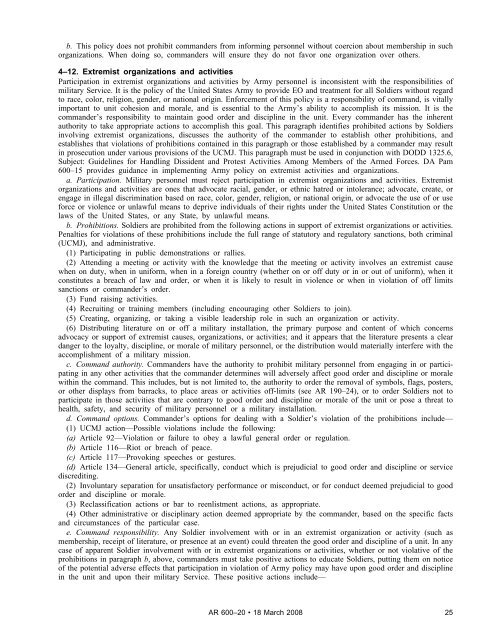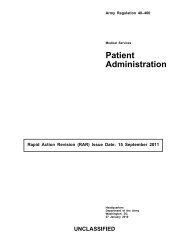AR 600-20, Army Command Policy - Army Publishing Directorate ...
AR 600-20, Army Command Policy - Army Publishing Directorate ...
AR 600-20, Army Command Policy - Army Publishing Directorate ...
Create successful ePaper yourself
Turn your PDF publications into a flip-book with our unique Google optimized e-Paper software.
. This policy does not prohibit commanders from informing personnel without coercion about membership in such<br />
organizations. When doing so, commanders will ensure they do not favor one organization over others.<br />
4–12. Extremist organizations and activities<br />
Participation in extremist organizations and activities by <strong>Army</strong> personnel is inconsistent with the responsibilities of<br />
military Service. It is the policy of the United States <strong>Army</strong> to provide EO and treatment for all Soldiers without regard<br />
to race, color, religion, gender, or national origin. Enforcement of this policy is a responsibility of command, is vitally<br />
important to unit cohesion and morale, and is essential to the <strong>Army</strong>’s ability to accomplish its mission. It is the<br />
commander’s responsibility to maintain good order and discipline in the unit. Every commander has the inherent<br />
authority to take appropriate actions to accomplish this goal. This paragraph identifies prohibited actions by Soldiers<br />
involving extremist organizations, discusses the authority of the commander to establish other prohibitions, and<br />
establishes that violations of prohibitions contained in this paragraph or those established by a commander may result<br />
in prosecution under various provisions of the UCMJ. This paragraph must be used in conjunction with DODD 1325.6,<br />
Subject: Guidelines for Handling Dissident and Protest Activities Among Members of the Armed Forces. DA Pam<br />
<strong>600</strong>–15 provides guidance in implementing <strong>Army</strong> policy on extremist activities and organizations.<br />
a. Participation. Military personnel must reject participation in extremist organizations and activities. Extremist<br />
organizations and activities are ones that advocate racial, gender, or ethnic hatred or intolerance; advocate, create, or<br />
engage in illegal discrimination based on race, color, gender, religion, or national origin, or advocate the use of or use<br />
force or violence or unlawful means to deprive individuals of their rights under the United States Constitution or the<br />
laws of the United States, or any State, by unlawful means.<br />
b. Prohibitions. Soldiers are prohibited from the following actions in support of extremist organizations or activities.<br />
Penalties for violations of these prohibitions include the full range of statutory and regulatory sanctions, both criminal<br />
(UCMJ), and administrative.<br />
(1) Participating in public demonstrations or rallies.<br />
(2) Attending a meeting or activity with the knowledge that the meeting or activity involves an extremist cause<br />
when on duty, when in uniform, when in a foreign country (whether on or off duty or in or out of uniform), when it<br />
constitutes a breach of law and order, or when it is likely to result in violence or when in violation of off limits<br />
sanctions or commander’s order.<br />
(3) Fund raising activities.<br />
(4) Recruiting or training members (including encouraging other Soldiers to join).<br />
(5) Creating, organizing, or taking a visible leadership role in such an organization or activity.<br />
(6) Distributing literature on or off a military installation, the primary purpose and content of which concerns<br />
advocacy or support of extremist causes, organizations, or activities; and it appears that the literature presents a clear<br />
danger to the loyalty, discipline, or morale of military personnel, or the distribution would materially interfere with the<br />
accomplishment of a military mission.<br />
c. <strong>Command</strong> authority. <strong>Command</strong>ers have the authority to prohibit military personnel from engaging in or participating<br />
in any other activities that the commander determines will adversely affect good order and discipline or morale<br />
within the command. This includes, but is not limited to, the authority to order the removal of symbols, flags, posters,<br />
or other displays from barracks, to place areas or activities off-limits (see <strong>AR</strong> 190–24), or to order Soldiers not to<br />
participate in those activities that are contrary to good order and discipline or morale of the unit or pose a threat to<br />
health, safety, and security of military personnel or a military installation.<br />
d. <strong>Command</strong> options. <strong>Command</strong>er’s options for dealing with a Soldier’s violation of the prohibitions include—<br />
(1) UCMJ action—Possible violations include the following:<br />
(a) Article 92—Violation or failure to obey a lawful general order or regulation.<br />
(b) Article 116—Riot or breach of peace.<br />
(c) Article 117—Provoking speeches or gestures.<br />
(d) Article 134—General article, specifically, conduct which is prejudicial to good order and discipline or service<br />
discrediting.<br />
(2) Involuntary separation for unsatisfactory performance or misconduct, or for conduct deemed prejudicial to good<br />
order and discipline or morale.<br />
(3) Reclassification actions or bar to reenlistment actions, as appropriate.<br />
(4) Other administrative or disciplinary action deemed appropriate by the commander, based on the specific facts<br />
and circumstances of the particular case.<br />
e. <strong>Command</strong> responsibility. Any Soldier involvement with or in an extremist organization or activity (such as<br />
membership, receipt of literature, or presence at an event) could threaten the good order and discipline of a unit. In any<br />
case of apparent Soldier involvement with or in extremist organizations or activities, whether or not violative of the<br />
prohibitions in paragraph b, above, commanders must take positive actions to educate Soldiers, putting them on notice<br />
of the potential adverse effects that participation in violation of <strong>Army</strong> policy may have upon good order and discipline<br />
in the unit and upon their military Service. These positive actions include—<br />
<strong>AR</strong> <strong>600</strong>–<strong>20</strong> 18 March <strong>20</strong>08<br />
25
















